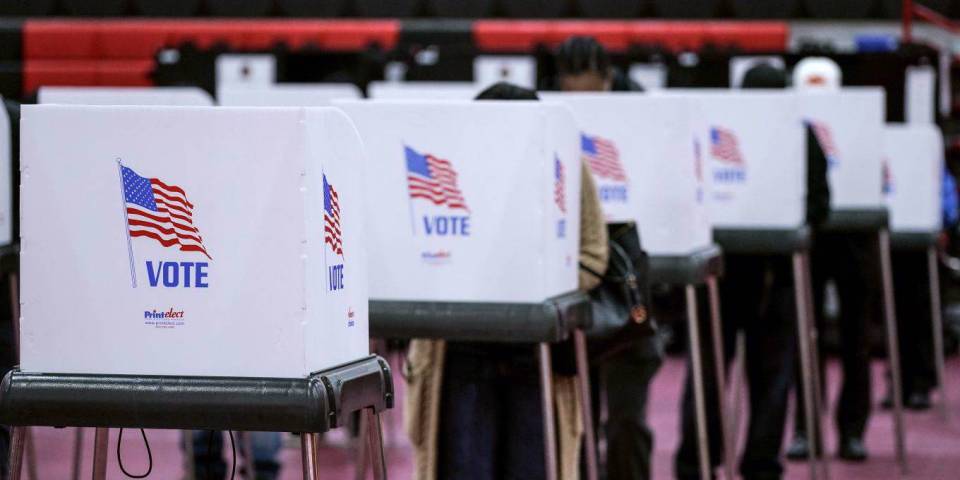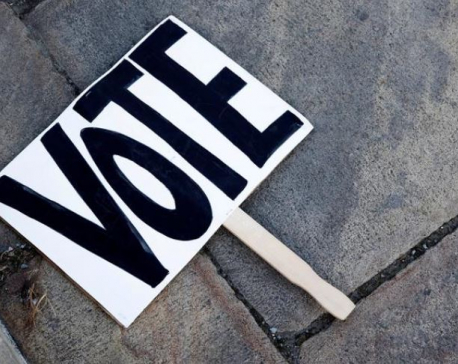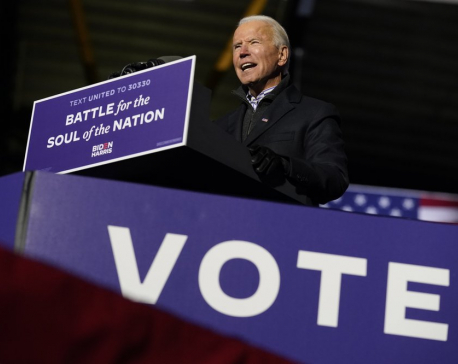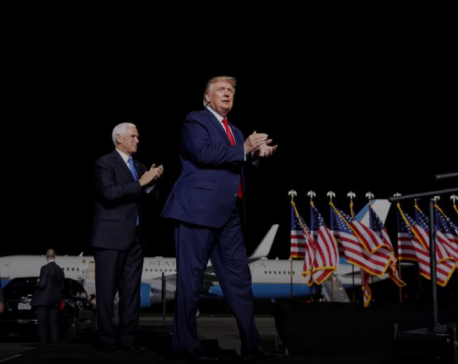
OR


Nouriel Roubini
The author is CEO of Roubini Macro Associates and Professor of Economics at the Stern School of Business, NYUnews@myrepublica.com
A highly contested election would cause further damage to America’s global image as an exemplar of democracy and the rule of law, eroding its soft power. Particularly over the past four years, the country has increasingly come to be regarded as a political basket case.
NEW YORK – Opinion polls in the United States have long pointed to the strong possibility of a Democratic Party sweep in the election on November 3, with Joe Biden winning the presidency and Democrats gaining control of the US Senate and holding on to the House of Representatives, putting an end to divided government.
But if the election turns out to be mostly a referendum on US President Donald Trump, Democrats might win just the White House while failing to retake the Senate. And one cannot rule out the possibility of Trump navigating a narrow path to an Electoral College victory, and of Republicans holding on to the Senate, thus reproducing the status quo.
More ominous is the prospect of a long-contested result, with both sides refusing to concede as they wage ugly legal and political battles in the courts, through the media, and on the streets. In the contested 2000 election, it took until December 12 for the matter to be decided: the Supreme Court ruled in favor of George W. Bush, and his Democratic opponent, Al Gore, gracefully conceded. Rattled by the political uncertainty, the stock market during this period fell by more than 7%. This time, the uncertainty could last for much longer – perhaps even months – implying serious risks for the markets.
This nightmare scenario must be taken seriously, even if it currently seems unlikely. While Biden has consistently led in the polls, so, too, had Hillary Clinton on the eve of the 2016 election. It remains to be seen if there will be a slight surge in “shy” swing-state Trump voters who are unwilling to reveal their true preferences to pollsters.
Moreover, as in 2016, massive disinformation campaigns (foreign and domestic) are underway. US authorities have warned that Russia, China, Iran, and other hostile foreign powers are actively trying to influence the election and cast doubt on the legitimacy of the balloting process. Trolls and bots are flooding social media with conspiracy theories, fake news, deep fakes, and misinformation. Trump and some of his fellow Republicans have embraced lunatic conspiracy theories like QAnon, and signaled their tacit support of white supremacist groups. In many Republican-controlled states, governors and other public officials are openly deploying dirty tricks to suppress the votes of Democratic-leaning cohorts.
On top of all this, Trump has repeatedly claimed – falsely – that mail-in ballots cannot be trusted, because he anticipates that Democrats will comprise a disproportionate share of those not voting in person (as a pandemic-era precaution). He also has refused to say that he will relinquish power if he loses, and has instead given a wink and a nod to right-wing militias (“stand back and stand by”) that have already been sowing chaos in the streets and plotting acts of domestic terrorism. If Trump loses and resorts to claiming that the election was rigged, violence and civil strife could be highly likely.
Indeed, if the initial reported results on election night do not immediately indicate a sweep for the Democrats, Trump would almost certainly declare victory in battleground states before all mail-in ballots have been counted. Republican operatives already have plans to suspend the counting in key states by challenging such ballots’ validity. They will be waging these legal battles in Republican-controlled state capitals, local and federal courts stacked with Trump-appointed judges, a Supreme Court with a 6-3 conservative majority, and a House of Representatives where, in the event of an Electoral College draw, Republicans hold the majority of state delegations.
At the same time, all of the white armed militias currently “standing by” could take to the streets to foment violence and chaos. The goal would be to provoke leftist counter-violence, giving Trump a pretext to invoke the Insurrection Act and deploy federal law enforcement or the US military to restore “law and order” (as he has previously threatened to do). With this endgame apparently in mind, the Trump administration has already designated several major Democratic-led cities as “anarchist hubs” that may need to be put down. In other words, Trump and his cronies have made clear that they will use any means necessary to steal the election; and, given the wide range of tools at the executive branch’s disposal, they could succeed if early election results are close, rather than showing a clear Biden sweep.
To be sure, if early results on election night show Biden with a strong lead even in traditionally Republican states such as North Carolina, Florida, or Texas, Trump would find it much harder to contest the result for more than a few days, and he would concede sooner. The problem is that anything short of a clear Biden landslide will leave an opening for Trump (and the foreign governments supporting him) to muddy the waters with chaos and disinformation as they maneuver to shift the final decision to more sympathetic venues such as the courts.
This degree of political instability could trigger a major risk-off episode in financial markets at a time when the economy is already slowing and the near-term prospects for additional policy stimulus remain grim. If an election dispute drags on – perhaps into early next year – stock prices could fall by as much as 10%, government bond yields would decline (though they are already quite low), and the global flight to safety would push gold prices higher. Usually in this type of scenario, the US dollar would strengthen; but, because this particular episode would have been triggered by US-based political chaos, capital might actually flee from the dollar, leaving it weaker.
One thing is certain: a highly contested election would cause further damage to America’s global image as an exemplar of democracy and the rule of law, eroding its soft power. Particularly over the past four years, the country has increasingly come to be regarded as a political basket case. While hoping that the chaotic outcomes outlined above do not come to pass – polls still show a strong lead for Biden – investors should be preparing for the worst, not just on election day but in the weeks and months thereafter.
Nouriel Roubini, Professor of Economics at New York University’s Stern School of Business, is host of the NourielToday.com broadcast.
Copyright: Project Syndicate, 2020.
www.project-syndicate.org
You May Like This

These states could decide the U.S. presidential election
These states will play a critical role in delivering the 270 Electoral College votes needed to win the White House.... Read More...

Trump, Biden cede stage to voters for Election Day verdict
WASHINGTON, Nov 3: After a campaign marked by rancor and fear, Americans on Tuesday decide between President Donald Trump and... Read More...

Trump says U.S. election winner might not be known for months
VIRGINIA, Sept 26: U.S. President Donald Trump said on Friday that Americans might not know the winner of the November... Read More...




Just In
- RBB invites applications for CEO, applications to be submitted within 21 days
- Telephone service restored in Bhotkhola after a week
- Chemical fertilizers imported from China being transported to Kathmandu
- Man dies in motorcycle accident in Dhanusha
- Nepal face early setback as four wickets fall in powerplay against UAE
- Australian unemployment rate rises to 3.8 percent in March
- Gold price increases by Rs 700 per tola
- Fire destroys wheat crop in Kanchanpur, Kailali














Leave A Comment